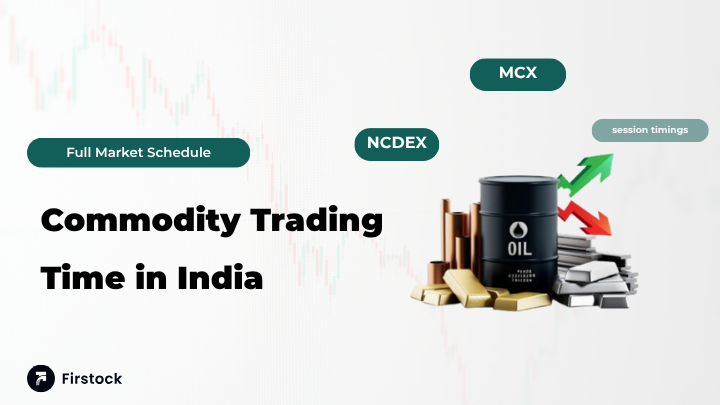Commodity Trading Time in India – Full Market Schedule

Commodity Trading Time in India: A Complete 2025 Guide for Beginners
Have you ever wondered how gold, silver, or crude oil are traded every day just like company shares? Welcome to the fascinating world of commodity trading — where traders deal not in company profits but in real goods that power our world.
If you’re new to this, understanding the commodity trading time in India is one of the first and most important steps. And with reliable online platforms like Firstock, getting started has never been easier
In this detailed guide, we’ll explore what commodity trading is, its timings, benefits, and how you can begin trading in India confidently.
Introduction to Commodity Trading
Commodity trading is one of the oldest forms of commerce in human history — dating back to when traders exchanged metals, grains, or spices across regions. Today, with modern technology and platforms like Firstock, this age-old concept has evolved into a sophisticated digital marketplace.
Trade in gold, crude oil or agricultural products, commodity trading provides an opportunity to all, big businesses or small investors.
What is Commodity Trading?
Commodity trading is the act of buying and selling of raw materials or original goods such as gold, oil or wheat. These products trade in dedicated exchange markets their prices dictated by the market forces - like stocks in a stock exchange.
You are not placing your money in the future of the company; you are placing your money on the value of the actual commodities that can be demanded.
Types of Commodities Traded in India
In India, commodities are classified into four major groups:
- Bullion: Gold, Silver, Platinum
- Base Metals: Copper, Zinc, Lead, Aluminum
- Energy: Crude Oil, Natural Gas
- Agricultural Commodities: Cotton, Wheat, Soybean, Sugar
Each category reacts differently to market conditions — and they all have specific commodity trading times.
Major Commodity Exchanges in India
India’s two main commodity exchanges are:
- MCX (Multi Commodity Exchange of India Ltd.) - It trades in energy commodities, bullion, and metals.
- NCDEX (National Commodity & Derivatives Exchange) -Focuses on farm produce.
The two exchanges are controlled by SEBI (Securities and Exchange Board of India) which has made them transparent and safe to traders.
Importance of Commodity Trading
Since we already have stock markets, why should anyone trade commodities?
because commodities diversify investments and serve as an inflation hedge. Commodity prices frequently increase when the stock market becomes volatile, assisting traders in keeping their portfolios balanced.
They also provide a means of lowering financial risks and locking in prices for producers, such as miners or farmers.
How Commodity Trading Works
Futures contracts are the primary method of commodity trading where a contract is signed to either sell or purchase a certain amount of a commodity at a particular price in the future.
Suppose a gold trader anticipates an increase in prices within months. They are able to purchase a futures contract now and sell it later at a gain when the prices rise.
Such contracts enable traders to make profits on fluctuations in prices without necessarily receiving the physical delivery of the goods.
Commodity Trading Time in India
The commodity trading time in India is divided into two main sessions:
The evening session overlaps with global market hours — making it the most active and volatile period for traders.
Trading Timings for Different Commodity Categories
Each category follows slightly different schedules:
Trading remains closed on weekends and official exchange holidays.
MCX Trading Time Explained
The MCX is India’s largest commodity exchange and is known for non-agricultural products.
- Morning Session: 9:00 AM – 5:00 PM
- Evening Session: 5:00 PM – 11:30 PM / 11:55 PM
Since MCX is heavily influenced by international markets, most traders prefer the evening session for higher liquidity and movement.
NCDEX Trading Time Explained
The NCDEX focuses on agricultural commodities and operates only during Indian business hours.
- Trading Time: 9:00 AM – 5:00 PM (Monday to Friday)
This timing aligns with the domestic market for crops and agri-products, minimizing international volatility.
How to Start Commodity Trading in India (with Firstock)
Getting started in commodity trading is now simple, thanks to platforms like Firstock — a trusted SEBI-registered broker that offers fast, secure, and affordable trading options.
Here’s how you can begin:
- Open a Firstock Account: Visit Firstock’s website and create a free trading account.
- Complete KYC: Submit your PAN, Aadhaar, and bank details.
- Choose Your Exchange: Select between MCX or NCDEX based on your interest.
- Fund Your Account: Add money through net banking or UPI.
- Start Trading: Analyze commodities, place orders, and monitor market trends — all on the Firstock platform.
Firstock provides real-time charts, low brokerage fees, and a user-friendly interface, making it ideal for both beginners and experienced traders.
Factors Influencing Commodity Prices
Several global and local factors impact commodity prices:
- Supply and Demand: Scarcity or oversupply affects prices directly.
- Weather Conditions: Especially crucial for agricultural products.
- Global Events: Wars, sanctions, or production cuts.
- Currency Fluctuations: Commodities are often priced in USD.
- Government Policies: Import/export duties and trade restrictions.
Understanding these factors helps traders predict trends and make smarter decisions.
Commodity Trading vs Stock Trading
While both are profitable, commodity trading offers more flexibility and global exposure.
Benefits of Trading Commodities
- Diversification: Protects your portfolio during stock market swings.
- Inflation Hedge: Commodity prices often rise when inflation increases.
- Leverage: You can trade larger values with smaller margins.
- Transparency: Fully regulated by SEBI for investor safety.
- Accessible Platforms: Brokers like Firstock - trading apps for beginners make entry easy and affordable.
Risks in Commodity Trading
No trading is risk-free. Common risks include:
- Volatile Prices: Rapid market changes can cause losses.
- Leverage Risk: Amplified losses due to high exposure.
- Global Dependencies: Unpredictable foreign factors.
A good strategy is to use stop loss orders, diversify trades, and avoid over-leveraging.
Best Time to Trade Commodities
Due to its overlap with the London and New York markets, the evening session (5 PM to 11:30 PM) is typically the best time to trade bullion, metals, and energy commodities.
The morning hours (9 AM to 3 PM) are the busiest and most liquid for agricultural commodities.
Tips for Successful Commodity Trading
- Educate Yourself: Learn about commodities and exchanges.
- Use Data & Charts: Study price movements and patterns.
- Plan Your Trades: Set clear entry and exit points.
- Manage Risks: Never invest more than you can afford to lose.
- Choose the Right Broker: Platforms like Firstock help you trade efficiently with low costs.
Trading commodities is like farming — you sow (invest) with care, nurture your crops (monitor the market), and harvest (profit) at the right time.
Conclusion
Some of the commodities that can be traded in India include gold, crude oil and grains among others. The right platform, such as Firstock, and the knowledge of the time of trading commodities in India can be the difference between the Random guess and a well-considered trade.
It is to be born in mind that it is knowledge and timing that are your best friends in such a market be it in diversifying, speculating, or hedging.
Since time is of the essence in the commodities business, trade small, remain informed, and trade in a sensible way.
FAQs
1. What is commodity trading in India?
Commodity trading in India involves buying and selling raw goods like gold, crude oil, or wheat through exchanges such as MCX and NCDEX.
2. What are the commodity trading times in India?
Trading happens from 9:00 AM to 5:00 PM for all commodities and extends till 11:30 PM / 11:55 PM for global commodities like gold and oil.
3. How can I start trading commodities on Firstock?
Simply open a free trading account with Firstock, complete KYC, fund your account, and start trading through MCX or NCDEX.
4. Is commodity trading risky?
Yes, due to global volatility. However, with proper research and risk control, it can be highly rewarding.
5. Which is the best time to trade commodities in India?
The evening session (5 PM – 11:30 PM) is best for metals and energy, while morning hours (9 AM – 3 PM) are ideal for agricultural commodities.





